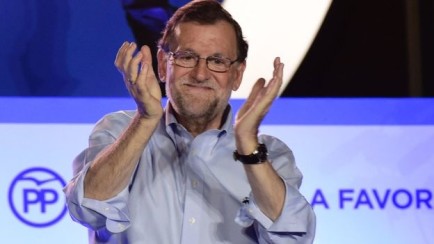
Acting Prime Minister Mariano Rajoy secured the most votes once more, but the People’s Party still does not have enough to secure a majority government.
Acting Spanish Prime Minister Mariano Rajoy looked triumphant. Why wouldn’t he? For the second time in six months, his Popular Party (PP) had won the most votes in a general election. At face value, this would appear to be a confirmation of the faith Spaniards have in his – and his party’s – ability to run the nation. But as ever in Spanish politics, things are never quite as simple as they seem…
Once again, the PP secured more votes than any other, winning 137 seats with 33% of the votes. However, that is still not enough to secure an overall majority, meaning the country finds itself in the same position it did in December. Almost.
In order to form a government, a workable coalition must be created, and the PP – if Rajoy wishes to continue as PM – must gain enough support from a number of other parties in order to reach that majority. Being of the right, it is highly unlikely to find any allies among its three main challengers: the Socialist PSOE (which won 85 seats and 23% of the vote), the leftist Podemos (71 seats and 21%) and the centre-left Ciudadanos (32 seats, 13%).
This means that the PP would have to try to secure support from all of the other smaller parties. However, with just 25 seats among them, would that be enough? It seems not.
In the immediate aftermath of the vote, Rajoy said that he expects the political parties to reach a deal within a month. “It would be nonsense to lose time for several more months,” he confirmed.
A message of support for the PP came from an unlikely source from within the Socialist PSOE party, with Extremadura leader Guillermo Fernández Vara saying that Rajoy should be in government “as soon as possible”. The PP managed to increase its share of the vote from December, gaining 15 seats in six months. That, Vara believes, is a sign that the voters have spoken and “that’s [back Rajoy] what we have to do.”
However, secretary of the PSOE César Luena said that the party had no intention of supporting the PP. “The PSOE wants to replace Rajoy,” Luena said. Hence, the circus may yet continue. Podemos, which had been expected to register a surge in votes, actually struggled and lost up to a million votes, with commentators suggesting that the shock of the UK Brexit decision may have turned voters off the more radical parties, with a vote for the status quo winning out.
But the extra votes gained by the PP are still not enough to allow the party to take control. Despite overseeing a steady economic turnaround, many in Spain still hanker for change, and perhaps the firebrand message being offered by Podemos has overshadowed the meeker terms being offered by the Socialists – who would deliver change, but not in such a dramatic way.
It is easy to see why the whole situation is confusing, and at times exhausting. The hope now, though, is that the politicians of all parties put aside their differences and try to thrash out a deal that serves the people of Spain, and soon.
 en
en



 Vlaams-Nederlands
Vlaams-Nederlands
0 Comments
Leave a Comment
DISCLAIMER
The opinions and comments expressed by contributors to this Blog are theirs alone and do not necessarily reflect the views of VIVA Homes Under the Sun Ltd, any of its associated companies, or employees; nor is VIVA to be held responsible or accountable for the accuracy of any of the information supplied.
Have you got something to say?